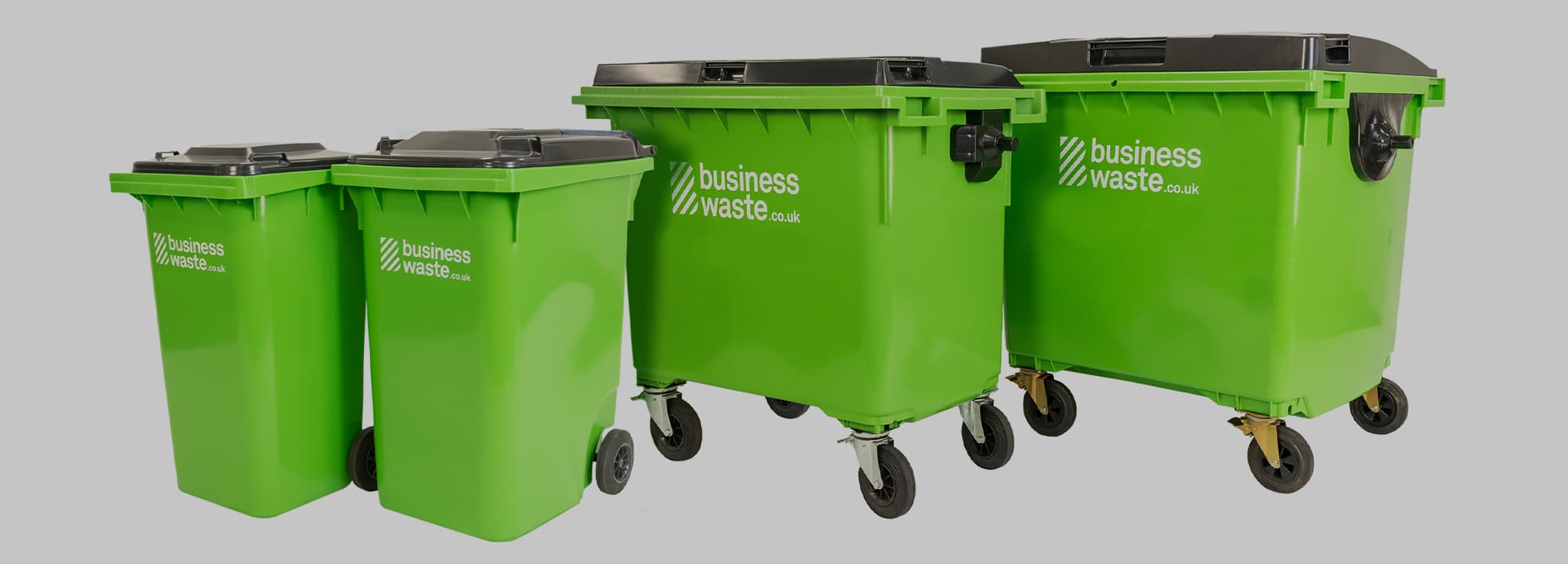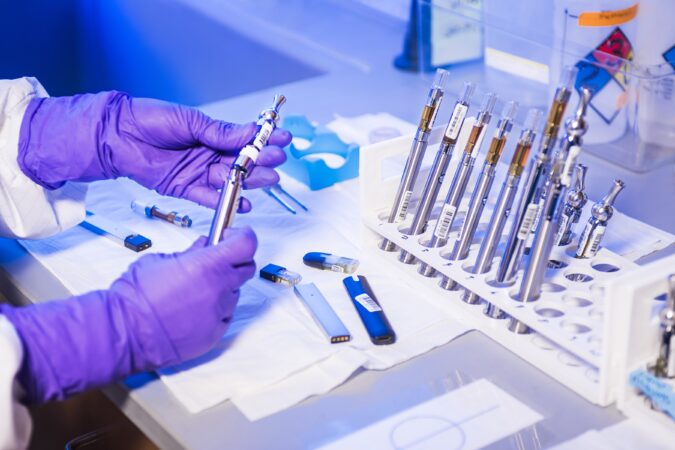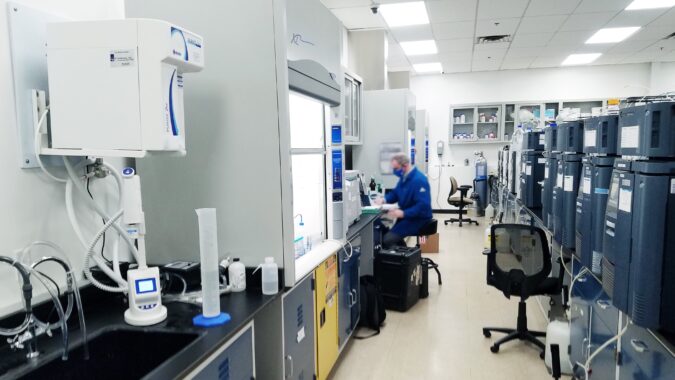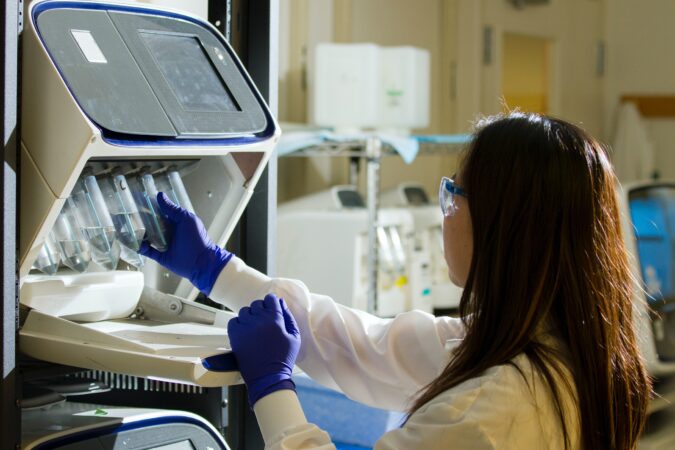
Laboratory Waste Management
Laboratory waste is often hazardous and requires strict storage, removal, and disposal. Under the Health and Safety Executive’s (HSE) regulations, hazardous laboratory waste must be controlled and managed suitably and sufficiently. All UK employers that produce hazardous waste must have an efficient waste management system in place for appropriate laboratory waste disposal.
Hazardous waste can be extremely dangerous and has the potential to seriously harm workers, the public, animals, and the environment. At Business Waste, we can help with your laboratory waste management. We can provide businesses across the UK with free bins and professional laboratory waste disposal services.
Learn more about how laboratory waste management works, the services we provide, and how to safely store and dispose of such waste. Get a free quote for laboratory waste collection from anywhere in the UK – contact us online or call 0800 211 8390.
Fast, Free Quotation
Get a fast FREE quote for your laboratory waste disposal
- Free quote within 1 hr
- Any type of lab waste
- FREE bins and delivery
- We cover all of the UK
Laboratory waste
disposal
Laboratory waste disposal doesn’t have to be a hassle. With the right help and professional assistance, your business could easily cut costs, improve its efficiency, and ensure your storage and disposal of laboratory waste is fully compliant with UK law. Simply arrange delivery and collection of the laboratory waste bins and containers you need, and we’ll dispose of it in the proper manner.
Disposal of laboratory waste can vary depending on its type:
- Dry mixed recycling – You can recycle metal, paper, cardboard, and plastic in a dry mixed recycling bin. This means you can easily dispose of old documents, papers, and packaging from your lab, without spending extra time sorting through them.
- Glass waste – Some glass used in laboratories is recyclable. However, you must ensure they didn’t have contact with any hazardous substances. Some lab glassware also has a higher melting point than conventional glass, which means it can’t be recycled. You should also ensure you don’t throw away broken glass in your recycling bin.
- Hazardous waste – Hazardous waste can’t always be recycled, such as items like sharps (needles, syringes, knives), radioactive waste, and cytotoxic waste. They can cause significant damage to human health or the environment. As such, hazardous waste normally undergoes chemical, thermal, biological, or physical treatment based on its classification, before environmentally friendly disposal.
Learn more about the different types of hazardous waste and their disposal methods.
The easiest way to arrange safe, compliant, and effective lab waste disposal is to use the correct storage containers and organise collection by a licensed carrier. For the management of laboratory waste, it’s essential that you have an efficient waste disposal system in place. We can provide businesses across the UK with professional laboratory waste disposal services.

Laboratory waste
bins and containers
When it comes to storing laboratory waste before collection, there are various factors to consider. Firstly, you must ensure you store all waste types securely in the correct laboratory waste bins and containers, separated by type. This should be somewhere few people can access, ideally in a locked area, to protect your employees and the public from harm.
Secure storage is also important to protect the environment. When disposing of chemicals, ensure they can’t spill or leak onto the ground by using proper laboratory waste containers. This is particularly important if you handle chemicals such as methanol – as it’s a significant fire hazard.
We can provide plenty of laboratory waste bins and containers for safe storage. Explore those available and find the right laboratory waste container for your organisation.
Laboratory waste
recycling
As a business owner running a lab, you’re legally obligated to ensure your company’s impact on the environment is minimal. By adhering to government regulations, and operating with the environment in mind, we can all play our role in protecting the planet. Recycling laboratory waste wherever possible is one way you can help achieve this goal.
A large amount of laboratory waste can be recycled. Storing such rubbish in separate laboratory waste containers and arranging collection by our licensed waste carriers can ensure they go to the proper facilities for recycling – rather than ending up in landfill. Recycling methods for lab waste vary depending on the material and items:
- Glass – certain types of glass from labs are recyclable. Glass is treated, cleaned, broken into cullet, heated, and moulded into new glass products.
- Sharps – some sharps items that aren’t contaminated may be treated and recycled in similar methods to other metals.
- Plastic – depending on the type of plastic, it might be shredded, cleaned, melted into pellets, and formed into new plastics.
- Metals – ferrous and non-ferrous metals can be shredded, melted, purified, and solidified as new metal products.
- Paper – waste paper is cleaned, then mixed with water and other materials to form fresh paper or cardboard.
Laboratory waste
collection
We offer a laboratory waste collection schedule to suit the requirements of your business. Our full waste audit identifies how much waste you generate to help determine the right bins, containers, and sizes, as well as how often your laboratory waste needs collecting. This could be a one-off or scheduled daily, weekly, or fortnightly.
Thanks to our nationwide network, we can provide lab waste collections across the UK. No matter where your laboratory is based, the size or industry you work in, we’ll have a laboratory waste collection service local to you. We’ll deliver free bins – you just pay for collection.
Fill each laboratory waste container with the relevant rubbish, store safely, and move to the agreed pickup point at the right time. One of our licensed waste carriers will then collect your lab waste and transport to a nearby facility for disposal or recycling in line with all relevant laws and regulations.
To discuss the different options for lab waste disposal, and to order your free bins, contact our advisers today for more information online or call 0800 211 8390. We’re happy to answer any queries you may have about laboratory waste disposal, and we can also offer you a free quote for our services.
How does laboratory
waste collection work?
-
Select your free bins
It’s quick and easy to organise commercial waste collection for your business.
Simply start by telling us the:
- Type of waste you need removing
- Size of bins you require
- Number of bins you want
We’ll provide you with a free quote.
-
Arrange delivery
When you’re happy with the type, number, and size of free bins, tell us when you need your bins delivering.
Let us know about any access issues where you want the bins delivering – such as locked gates, access codes and times. We’ll get you up and running in no time.
-
Fill up your bin
After the free bins arrive at your chosen location, fill them up with the agreed waste type.
Make sure you remain within any weight limits for the specific waste type and bin size.
-
Get your business waste collected
We’ll arrange waste collection at a time and frequency to suit you and the amount of waste you have.
As featured in…
What is
laboratory waste?
Laboratory waste is any type of rubbish produced in a laboratory, whether it’s for industry, research, or educational purposes. Lab waste comes in many different forms and materials, many of which must follow special disposal procedures. Due to the nature of lab activities, much of the waste produced can be hazardous.

At Business Waste, we’re qualified and able to dispose of the following types of laboratory waste:
- Sharps – scalpels, knives, and other sharp instruments.
- Contaminated containers – glass, plastic, and containers with residue.
- Chemical waste – leftover and used chemicals from experiments and research.
- Broken glass – damaged test tubes and other glassware.
- Alcohol and mercury thermometers – used to check temperatures and may become contaminated.
- Spent silica – silica gel often used in laboratory processes.
- Biohazardous waste – any waste contaminated with infectious materials.
- Radioactive waste – hazardous waste that poses a serious risk to human health.
- Cytotoxic waste – often produced in pharmaceutical labs, including drugs and equipment contaminated with cytotoxic residue.
- X-ray waste – any X-ray film, chemicals, or equipment used in the lab that aren’t needed any more.
Who needs laboratory
waste disposal?
All sorts of laboratories can produce different types of lab waste. Whatever the sector and purpose of running a laboratory, any waste generated needs disposing of in the proper manner – even if it’s simply recycling packaging materials. The main laboratories that need waste disposal are those that operate in the following industries:
- Education
- Pharmaceutical
- Medical
- Manufacturing
- Research
The best way to ensure your laboratory waste disposal is adequate and fully compliant with the relevant regulations, is to outsource to an approved waste provider – such as through Business Waste.

Read our reviews
James was very helpful and to be honest since starting with this company the service has been excellent.Christeen Norfolk
Laboratory waste
FAQs
-
Why is laboratory waste management important?
Laboratory waste management is important because all types of labs can generate hazardous, infectious, and other kinds of dangerous waste that may be harmful to human health and the environment via improper disposal. Having a laboratory waste management plan in place helps ensure safe and proper disposal of laboratory waste.
This significantly reduces the risk of exposing lab, other staff, and the general public to toxins and dangerous materials. Plus, it should ensure all lab waste is disposed of properly, meaning no waste ends up in landfill where it could leach and contribute to pollution.
-
What is medical laboratory waste?
Medical laboratory waste is any materials contaminated with blood or bodily fluids, which may have been used in lab experiments, tests, or other processes. Examples of medical laboratory waste could include contaminated gloves, masks, and pads. Controlled substances and pharmaceuticals are also kings of medical lab waste.
-
What is laboratory chemical waste?
Laboratory chemical waste can be any solid, liquid, or gas with chemical properties produced in a lab. Most are a form of hazardous waste if they’re toxic, flammable, reactive, or corrosive and therefore require safe and proper laboratory chemical waste disposal. Some types are non-hazardous but still need disposing of in an appropriate manner.
Get a fast, free quote for laboratory waste disposal
Get a fast FREE quote for laboratory waste removal
- Free quote within 1 hr
- Any type of lab waste
- FREE bins and delivery
- We cover all of the UK